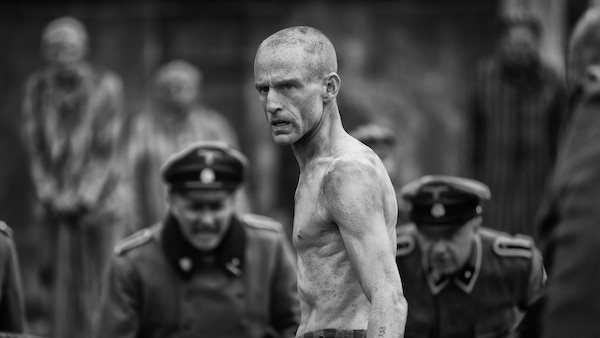Television Review: “The Survivor” — What Price Survival?
By Sarah Osman
The Survivor examines what happens to someone who made the decision to survive in Auschwitz — no matter how.
The Survivor, directed by Barry Levinson. HBO MAX

A scene from The Survivor. HBO/HBO Max
The Sonderkommandos were prisoners in concentration camps who were forced to take care of the victims of the Nazis gas chambers. Their reward for shoveling away the corpses and then cleaning out the gas chambers — an opportunity to live to see another day. Some critics charge that the Sonderkommandos were German collaborators, despite the fact that they were prisoners and did not have a choice. That primal quandary is at the center of director Barry Levinson’s powerful new film, The Survivor. What is the price of survival? However, rather than a conventional focus on the Sonderkommandos, the narrative explores the hellish situation of prisoner who did what he felt he had to in order to see another day.
Based on Alan Haft’s book Harry Haft: Survivor of Auschwitz, Challenger of Rocky Marciano, the film look at the life of Harry Haft (Ben Foster), a survivor of Auschwitz. While in the camp, Haft protected another prisoner by beating a Nazi officer. Another Nazi, Schneider (Billy Magnussen), takes notice of his athleticism, and recruits Haft to box other prisoners for the other officers’ entertainment. Haft has to win every bout: the loser goes to the gas chambers. Over the course of the “contests,” Schneider develops a morbid curiosity in Haft, treating him as his pet.
Beautifully shot, the scenes set in Auschwitz are filmed in black and white a la Schindler’s List. The Survivor does not try to compete with Spielberg’s classic in terms of horror, but Levinson doesn’t shy away from conveying the camp’s inhuman reality. Haft’s fights go well beyond the conventionally disturbing because they are so grotesque: we watch the boxers bloody one another, struggling to overcome their opponents. Other prisoners play violin while Nazi officers gather around a large buffet eating their fill.
Half of the film is told through flashbacks, while the other half takes place in 1949 New York. Haft is a local fighter who is down on his luck. Shot in faded color, these scenes focus on the man’s determination to box the champ, Rocky Marciano. Haft is not hungry for a heavyweight title; he wants his name in the newspapers. His love, Leah, was taken to the camps, and he’s desperate to find out if she is alive or not. In his gut, he feels that the woman is alive. His hope is that maybe, just maybe, she’ll reach out if she knows that he is too. In order to get the word out, Haft even agrees to an interview with a reporter who prints his story about how he survived in the camps. The publicity angers his community, which is anxious to erase the brutal past.
The Survivor isn’t a linear Holocaust narrative and that is to its credit. Levinson isn’t so much interested in the inhuman decisions some victims made in impossibly barbaric situations, such as Primo Levi’s example of one prisoner killing another for a crust of bread. The Survivor examines what happens to someone who made the decision to survive — no matter how. Throughout the film, Haft grapples with his career as a “boxer” in the death camp. How can he maintain his sanity haunted by such traumatizing memories? In one heart wrenching scene, Haft hears fireworks and immediately drops to the ground. His mind flashes back to memories of Nazis showering his camp with gunfire. No matter what Haft does, his past – and how he made it through the death camp — follows him. He tries to justify to others what he had to do, but he is condemned and shunned. The amoral world of Auschwitz is utterly alien to Americans; a prisoner could condemn another to death simply by taking his cap.
The role of the tortured Harry Haft is challenging, and Foster rises to the occasion, supplying the depressed fighter’s personality with plenty of complexity. His Haft is tough, but also tender; stoic, but also funny. Foster is surrounded by equally accomplished actors, including Danny DeVito as Marciano’s Jewish manager, Magnussen’s coolly cruel Schneider, and Peter Sarsgaard as the reporter who traces Haft’s story.
Haft did box Marciano after he survived Auschwitz. The film’s team was supported by a group of historians from the USC Shoah Foundation who have ensured The Survivor‘s historical accuracy. The unspeakable crimes of the Nazis have inspired libraries of fiction and non-fiction. But there has been considerably less attention devoted to the aftermath, to dissecting the plight of the survivors of the camps, perhaps because of its moral ambiguity as well as its implicit condemnation of our postwar failures to comprehend and empathize. With The Survivor, Levinson has made an invaluable step toward ameliorating that neglect.
Sarah Mina Osman is a writer residing in Wilmington, NC. In addition to writing for the Arts Fuse, she has written for Watercooler HQ, Huffington Post, HelloGiggles, Young Hollywood, and Matador Network, among other sites. Her work was included in the anthology Fury: Women’s Lived Experiences in the Trump Era. She is currently a first year fiction MFA candidate at the University of North Carolina Wilmington. When she’s not writing, she’s dancing, watching movies, traveling, or eating. She has a deep appreciation for sloths and tacos. You can keep up with her on Twitter and Instagram: @SarahMinaOsman
Tagged: Auschwitz, Barry Levinson, Ben Foster, Holocaust, Jewish survivors, Nazi, Sonderkommandos
